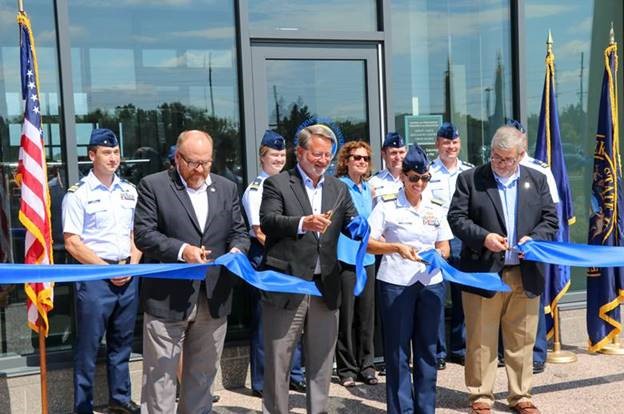PHOTOS: Peters, Lake Superior State University, U.S. Coast Guard & Sault Ste. Marie Mayor Cut Ribbon for U.S. Coast Guard Great Lakes Center of Expertise
Center of Expertise, Enacted into Law by Peters-led Efforts, Will Study Impacts of Oil Spills in Freshwater Environments
SAULT STE MARIE, MI – U.S. Senator Gary Peters (MI) – along with Lake Superior State University President Dr. Rodney S. Hanley, U.S. Coast Guard Assistant Commandant for Response Policy Rear Admiral Jo-Ann Burdian, and Sault Ste. Marie Mayor Don Gerrie – today participated in the official ribbon-cutting ceremony of the U.S. Coast Guard Great Lakes Center of Expertise at Lake Superior State University’s Richard & Theresa Barch Center for Freshwater Research and Education. Peters delivered remarks applauding the Coast Guard’s selection of Michigan to be home to the center and highlighting the critical role it will play in protecting the Great Lakes for future generations. Following the speaking program and ribbon-cutting ceremony, Peters toured the facility with Director of the Center for Freshwater Research and Education Dr. Ashley Moerke and U.S. Coast Guard Lieutenant Commander Kit Pace.
Peters-led efforts made the Great Lakes Center of Expertise a reality. Peters authored and passed legislation into law establishing the Great Lakes Center of Expertise in 2018, and then successfully secured $4.5 million in total to kick-start the initiative the following year. Last year, Peters announced the Great Lakes Center of Expertise will be headquartered in two Michigan locations to maximize research and operational capabilities. Lake Superior State University in Sault Ste. Marie will serve as the hub of the Great Lakes Center of Expertise and home to its supervisor, while another location will be at the Great Lakes Environmental Research Laboratory in Ann Arbor. The Great Lakes Center of Expertise will examine the impacts of oil spills in freshwater environments and help develop effective responses, which will be critical in protecting the Great Lakes, as current oil spill response technologies are primarily designed for saltwater environments.
“We know that an oil spill in the Great Lakes – particularly in the Straits of Mackinac – would be catastrophic not only for Michigan but the entire country. It’s absolutely critical that we do everything in our power to protect them and improve our preparedness against a potential spill,” said Senator Peters, a member of the Senate Commerce, Science, and Transportation Committee. “This Center is going to position Michigan as a national leader in providing critical research on how we can best mitigate and prepare against potential oil spills to protect our environment, economy, and precious natural resources in Michigan. I was excited to be here to celebrate the start of this important work. I was proud to have helped make the Center a reality and will keep working to ensure they have the support and resources needed for success.”
“More than 30 million people in the United States reside in the Great Lakes Basin, and more than 40 million people in the United States and Canada rely on the Lakes for their drinking water. But even with how critical the Great Lakes are to the welfare and well-being of so many people, oil spills threaten the water quality and ecosystems of the Lakes – whether it’s from vessels, pipelines, rail, on- or near-shore facilities,” said Lake Superior State University President Dr. Rodney S. Hanley. “It’s now more important than ever to protect the beauty of the Great Lakes from the impacts of oil spills. The new center will examine the impacts of oil spills and freshwater environments and help them develop effective responses to them. We are especially appreciative to the leadership of Senator Peters, the United States Coast Guard, the Great Lakes Environmental Research Lab, and the faculty and students of Lake Superior State University.”
“I want to extend my deepest gratitude to you, Senator Peters, for your continued support of the Coast Guard writ-large and certainly of this particular project,” said U.S. Coast Guard Assistant Commandant for Response Policy Rear Admiral Jo-Ann Burdian. “One of our priorities is to advance our mission of excellence and that really is what this Center of Expertise will do. We are uniquely positioned to solve tough problems, and the only way to solve tough problems is together. And that’s what a facility and the infrastructure of these relationships do – to share best practices, to study, to learn, to grow, and really speed up the delivery of new technologies to the operators in the field, which is a tremendous opportunity for this Great Lakes community, but also as a model for future operations nationally.”
“We’re especially thankful for the leadership and support of U.S. Senator Gary Peters. Without his efforts, the center would not have been possible,” said Sault Ste. Marie Mayor Don Gerrie. “We’re exceptionally grateful for Lake Superior State University and the U.S. Coast Guard presence in our community. Mere words can never express the appreciation that we hold for each entities’ role in our society, and this partnership is nothing short of amazing. This center will help to ensure the protection of our vital water resources.”
To download photos of Peters at the ribbon-cutting ceremony, click here or below. Photos are courtesy of Senator Peters’ office.
###
